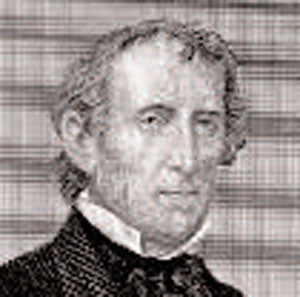John Tyler
10th president - 1841-1845

Taking over his predecessor's duties unexpectedly, Tyler found the early months of his presidency dominated by the question of whether he had assumed merely the duties or the office as well. The constitution was ambiguous, but Tyler was in no doubt – returning mail addressed to the "Acting President" with the comment "addressee unknown". The controversy was barely resolved when the Whigs who had swept Harrison to power were shocked to find that Tyler was not prepared to follow their programme meekly. Instead, he twice vetoed legislation initiated by the Whigs in Congress to re-establish the Bank of the United States, earning himself the impassioned hostility of his erstwhile supporters. He received numerous death threats, and the rest of his administration was hampered by ferocious opposition. Altogether, Tyler cast nine vetoes in four years.
His main accomplishments were the agreement with the UK of firm boundaries between Maine and Canada in the Webster-Ashburton Treaty of 1842; and the beginning of the annexation of Texas. Tyler approved the treaty for this in April 1844 but the Senate refused to ratify it, and the process was not completed until after the end of his term.
Earlier in 1844 he had narrowly escaped death while inspecting the USS Princeton. A ceremonial firing of a new naval supergun – the world's largest – resulted in a disastrous explosion in which many of those on board (including the father of Tyler's future wife, Julia) were killed. But Tyler was unscathed.
A former governor of Virginia, he was a shy, dignified man who probably did not deserve – and certainly did not enjoy – the vituperation he suffered. He retired to his 1,200-acre estate near Richmond, with his new second wife, and fathered a further seven children. (He already had eight by his first wife.)
When the Civil War broke out in 1861, Tyler tried to negotiate a peaceful settlement between North and South. When this failed, he served briefly as a member of the Provisional Congress of the Confederacy – which caused some to accuse him again of treachery. When he died, in 1862, his body lay in state at the Confederate Congress, draped in a Confederate flag; in Washington, his death was ignored. Not until 1915 did Congress authorise the erection of a memorial stone over his grave.
In his own words
"Popularity, I have always thought, may aptly be compared to a coquette – the more you woo her, the more apt she is to elude your embrace."
"If the tide of defamation and abuse shall turn, and my administration come to be praised, future vice-presidents who may succeed to the presidency may feel some slight encouragement to pursue an independent course."
"In 1840 I was called to my farm to undertake the administration of public affairs, and I foresaw that I was called to a bed of thorns. I now leave that bed, which has afforded me little rest, and eagerly seek repose in the quiet enjoyments of rural life."
In others' words
"His manner was remarkably unaffected. I thought that in his whole carriage he became his station well." Charles Dickens
"An honest, affectionate, benevolent, loving man... who had fought the battles of his life bravely and truly, doing his whole great duty without fear, though not without much unjust reproach." General Henry A Wise
"I could not believe that a man so commonplace, so absolutely inferior to many 15 shilling lawyers with whom you may meet at every county court in Virginia, would seriously aspire to the first station among mankind." John H Pleasants (editor of the Richmond Whig)
Minutiae
Tyler was so unpopular, especially with his own party, that he was granted the first federally funded White House security force. Four plain-clothed guards were employed to protect him.
Tyler had 15 children by two wives. The second (Julia) was five years younger than his eldest daughter when she married him. His immediate family thus spanned a century and a half. He himself was born during George Washington's administration; his youngest daughter died when Harry Truman was president.
He was a gifted violinist.
He claimed to be a descendant of Wat Tyler, leader of the Peasants' Revolt of 1381.
Join our commenting forum
Join thought-provoking conversations, follow other Independent readers and see their replies
Comments
Bookmark popover
Removed from bookmarks